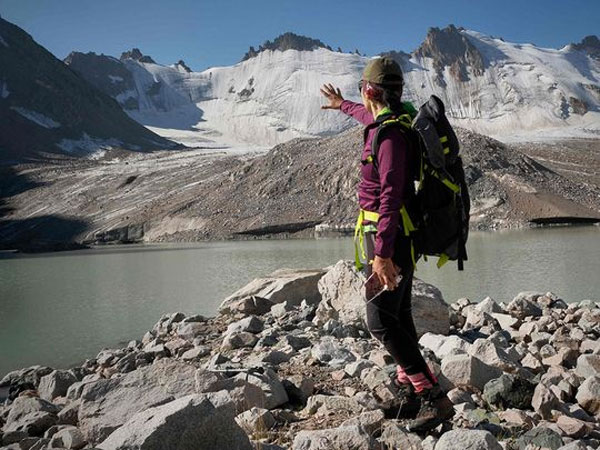‘Disappeared completely’: melting glaciers worry Central Asia


At an altitude of 4,000 metres, the 35-year-old researcher is surrounded by the giant peaks of the towering Tian Shan range that also stretches into China, Kazakhstan and Uzbekistan. The area is home to thousands of glaciers that are melting at an alarming rate in Central Asia, already hard-hit by climate change.
A glaciologist, Omarova is recording that process — worried about the future. She hiked six hours to get to the modest triangular-shaped hut that serves as a science station — almost up in the clouds.
“Eight to 10 years ago you could see the glacier with snow,” Omorova told AFP. “But in the last three-to-four years, it has disappeared completely. There is no snow, no glacier,” she said. The effects of a warming planet have been particularly visible in Central Asia, which has seen a wave of extreme weather disasters. The melting of thousands of glaciers is a major threat to people in the landlocked region that already suffers from a shortage of water. Acting as water towers, glaciers are crucial to the region’s food security and vital freshwater reserves are now dwindling fast.
‘Measuring everything’: Equipped with a measuring device, Omorova kneeled over a torrent of melted water, standing on grey-covered ice shimmering in strong sunshine.
“We are measuring everything,” she said. “The glaciers cannot regenerate because of rising temperatures.” A little further on, she points to the shrinking Adygene glacier, saying it has retreated by “around 16 centimetres (six inches)” every year. “That’s more than 900 metres since the 1960s,” she said. The once majestic glacier is only one of thousands in the area that are slowly disappearing.
Between 14 and 30 percent of glaciers in the Tian-Shan and Pamir — the two main mountain ranges in Central Asia — have melted over the last 60 years, according to a report by the Eurasian Development Bank. Omorova warned that things are only becoming worse. “The melting is much more intense than in previous years,” she said.
With scientists warning that 2024 is likely to be the hottest year on record, professions like hers have hugely grown in importance.
But resources are scarce in Kyrgyzstan — one of the poorest countries in former Soviet Central Asia.
Recent Posts
- World
Sir Elton John prepares for the future amid health concerns
Sir Elton John has reportedly made plans for the future, purchasing a property near his…
- World
Iran warns US of strong response to threats of bombing
Iran’s Supreme Leader, Ayatollah Ali Khamenei, warned on Monday that the US would face a…
- World
Microsoft turns 50: leading the charge in AI and cloud computing
Microsoft marks its 50th anniversary this year, celebrating a legacy of innovation in the tech…
- World
Trump confident of tiktok deal before deadline
President Donald Trump expressed confidence in reaching a deal on TikTok before the April 5…
- Pakistan
Sugar import approval delayed as prices stay above government cap
The Pakistani government has yet to approve the import of raw sugar for re-export, amid…
- Lifestyle
Macaulay Culkin opens up about estrangement from his father and its impact
Macaulay Culkin has revealed the painful reason behind his decades-long estrangement from his father, Christopher…
Leave a Comment